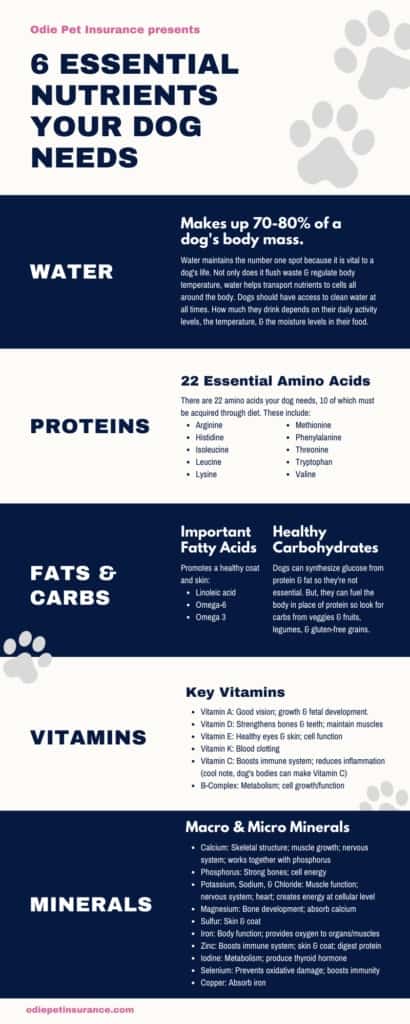Finding The Best Dog Nutritional Supplements For Overall Health

As pet owners, one of our biggest concerns is if our dog is getting enough nutrients in their diet. For many dogs, their daily nutritional requirements will remain the same for a majority of their life. But for others, there may be slight changes as they reach adulthood and age into their senior years.
While U.S. pet owners have done a great job ensuring dogs live longer, we are also seeing a growing increase in dog obesity. Both concerns for age and obesity have made dog owners increasingly aware of aiding supplements on the market. These include everything from multivitamins to joint support and omega-3’s or fatty acids for a shinier coat. Without proper testing, it can be difficult to decide whether or not your dog needs additional supplements. It’s important for pet owners to consult with their veterinarian regularly regarding the vitamins and minerals their dog requires to stay happy and healthy.
Do All Dogs Need Supplements?
These days, most commercial dog foods provide the adequate vitamins and minerals our pets need to age well. However, this is not true of all diets. For example, if you plan on feeding your pooch home-cooked meals, make sure you are including the key vitamins and minerals all dogs really need.
There are six essential nutrients every dog needs to stay healthy: Water, Proteins, Fats, Carbohydrates, Vitamins, and Minerals.

Giving your dog more nutrients than he or she actually needs can take the opposite effect and be very harmful to your pet. In order to determine whether your dog is receiving sufficient vitamins and minerals in their diet, your veterinarian can perform a blood test to examine the canine’s dietary status.
Benefits of Dog Supplements
According to the Whole Dog Journal, there are three primary reasons why a supplement would be valuable for your dog. First, a supplement would be necessary if the dog is showing a deficiency in a particular nutrient. The deficiency may be physically apparent in the dog’s skin and coat or in their daily energy levels. As mentioned earlier, a deficiency can be discovered with a simple blood test. Often, once a dog receives the ideal dose of the missing nutrients through a supplement, their well-being improves.
The second reason to incorporate supplements into your dog’s routine is to optimize their nutrient levels. We realize that for humans, the minimum daily requirement isn’t generally the ideal day by day dose. Instead, it’s the base requirement needed to shield indications of major deficiencies from showing up on a blood test. Adding a supplement may be necessary for dogs if they’re eating a standard commercial food with little to no nutrient enhancements. Feeding them a higher-quality food or adding a supplement can help provide proper amounts of significant minerals including calcium, iron, copper, and zinc.
The third reason supplements are used is for preventative and therapeutic measures. Supplements can be used to delay the onset of disease or reduce joint mobility as the dog ages. In other cases, supplements can be used to boost the immune system if the dog experiences seasonal allergies.
The Best Multivitamin for Dogs
If you and your vet decide that a multivitamin supplement is the right choice for your dog, then you’ll want to find a very high-quality product. Like dog food, not all brands are made to the same standards. While the FDA does oversee animal supplements, brands only need to meet the bare minimum.
There are a few brands we have personally tested and have seen great results with our dogs.
- Natural Dog Company Multivitamin Supplement – $24.95
- Front of the Pack The One All-in-One Daily Dog Supplement – $34.37
If you want to research other brands, PetMD put together some great tips when searching for the best supplements:
- Search for brands that have done clinical studies on their products.
- Make sure you understand what the ingredients mean. Don’t be fooled by ingredients that sound “nutritious” but really aren’t.
- Companies that do quality control checks will likely print a lot number on the product packaging.
- Do some additional research and call the company directly to inquire about their experience and manufacturing.
- If it sounds too good to be true, it probably is.
- Check if any third-parties have verified the supplements.
- Human supplements are not made for dogs, so be extra cautious.
- Look for a trusted seller such as an experienced vet.
What is the Best Joint Supplement for Dogs?
When it comes to joint supplements, adding them into your dog’s daily routine primarily depends on your dog’s breed. That’s because certain breeds are more prone to hip dysplasia and joint issues throughout their life. For these breeds, a joint supplement is typically recommended at 12-18 months old for future prevention.
Below are dog breeds that are predisposed to hip dysplasia and joint problems:
- American Staffordshire Terriers
- Bloodhounds
- Bernese Mountain Dogs
- Boxers
- Bullmastiff
- Chow Chows
- Chesapeake Bay Retrievers
- Clumber Spaniel
- Dachshunds
- French Bulldogs
- German Shepherds
- Great Danes
- Golden Retrievers
- Golden Setters
- Labrador Retrievers
- Newfoundlands
- Otterhounds
- Old English Sheepdogs
- Pit Bulls
- Pugs
- Rottweilers
- Saint Bernards
Even if your pet isn’t on the list of breeds with predisposed joint issues, a joint supplement can still be beneficial as your dog starts to age. You may notice that your dog seem more “stiff” than usual or has lost that “spring” in their step. Another common cause of joint problems is dog obesity. Obesity in dogs is one of the most preventable diseases and should be addressed immediately. There is no excuse for causing your pet lifelong suffering from something that is fixable.
In the meantime, here are some of the common symptoms of achy joints:
- Swollen joints
- Difficulty sitting down or standing up
- Hesitation to jump in the car
- Obvious stiffness
- Limping or not wanting to put pressure on a particular leg
When looking for a good joint supplement for your dog, you’ll want to look for inflammatory and lubricating ingredients. These are going to promote mobility and ease any day-to-day stiffness. Some superstar ingredients to look for in a mobility supplement can be found below.
Omega-3
This essential and nutritional fatty acid not only supports healthy joint function, but it also supports brain development in puppies, and helps improve your dog’s skin and coat. When looking for enriching Omega 3s, you’ll want to look for supplements with EPA and DHA. Both of these are extremely helpful in reducing arthritis inflammation in dogs.
Tumeric
We love that joint supplements are being to include Tumeric. That’s because it is naturally anti-inflammatory, which helps relieve the pain and stiffness caused by arthritis. Before you give your dog supplements containing Tumeric, there is a word of caution. It is a blood thinner, so we highly recommend consulting your vet before adding this to your dog’s diet.
Glucosamine
This is one of the most popular ingredients in arthritis and joint supplements for dogs because it is naturally occurring and is known to alleviate pain and ease recovery from joint surgery. Glucosamine does this by aiding in the repair of damaged cartilage.
We have a Golden Retriever and an older Vizsla who both receive a daily joint supplement. The brands we have tested and have seen great results with are:
- Maev Hip & Joint Vitamin Bars – $34.00
- Wild Earth Hip & Joint Dog Supplements – $30.00
- Nutramax Cosequin Maximum Strength Plus MSM – $17.99
Benefits of Using The Best Senior Dog Vitamins
As dogs age, they experience a ton of physical and mental changes. Their activity levels start to slow down, they aren’t able to digest or absorb nutrients as easily, and their immune functions aren’t what they used to be. Our responsibility as responsible pet owners is to provide extra care to our aging pups. A dog is considered senior when they reach 7 years old. It goes too quickly, am I right? Giving your dog the right food and supplements can greatly improve their final years. Before deciding on a nutrition plan or added supplements for your dog, consult with your veterinarian to ensure it is safe.
There are three main supplements vets highly recommend for senior dogs which can easily be found in a combination supplements.
Omega 3s and 6s
These essential fatty acids will not only help with your dog’s skin and coat, they are super helpful in reducing arthritis pain and inflammation. When looking at the ingredients for a supplement, make sure to take a look at the EPA levels. According to an article written by Dr. James St. Clair, in order for your dog to get the full benefits of Omega 3, they “need to consume 100mg/kg of EPA alone.”
Glucosamine and Chondrotin
Glucosamine is highly recommended for senior dogs because it is one of the most researched dog supplement. These paired together are helpful in aiding and restoring healthy cartilage in dogs and providing joint lubrication.
Probiotics
Because older dogs have a more difficult digesting food and absorbing nutrients, a good probiotic is helpful. Probiotics support gut health by replacing healthy bacteria and boosting the immune system.
Ideas for Choosing Dog Supplements
If you’ve spoken to your veterinarian and you’ve decided to give your furry friend dog supplements of one type or another, the next step is choosing them properly. This is important for obvious reasons, as choosing the cheapest or the one you may have heard of without any additional research could prove counterproductive at best or harmful at worst. So how do you go about choosing dog nutritional supplements?
One of the best first steps you can take is to look for brands of dog supplements that have commissioned clinical studies on their products. This will not only indicate that the manufacturer is transparent about what they’re producing, but will also give you an opportunity to dig deeper into its prospective benefits based on that study or those studies.
In addition, you should get accustomed to reading and understanding the labels on dog supplements. This may seem a bit daunting at first, but an Internet browser should help you quickly identify substances that you do not recognize. If you see anything on the label that you do not like, think long and hard about whether these dog vitamins are worth your time, money, and risk.
Finally, trust your best instincts. Unfortunately, there are quite a few dog supplements out there that really don’t accomplish anything. If you read a label or research a company and feel like what they’re telling you is too good to be true, it probably is. This is no different than any other line of products.
Summary
While most quality dog foods do an excellent job of providing the proper vitamins and minerals a dog needs on a daily basis, giving your dog a supplement(s) can help with ongoing preventative care. It’s advised that you speak with your dog’s veterinarian before giving your dog any new supplements. They will recommend quality brands and have the best insight into what your dog needs.
Trying to find the right vet for your companion? You can read more about choosing a vet that gets your pet here.



